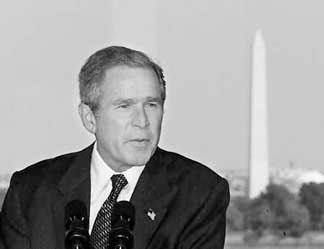Nine days after terror, George W. Bush delivered his State of the Union address. Many students did not watch the speech. For the college student, Wednesday the 20th was a busy night. It was the middle of the week, early evening. Concerts, meetings, papers, or projects took precedence over listenning to the Address in a number of students’ minds. Little over a week after the terror, students were settling into the usual priorities. Guilford was attempting to go on, whether Bush had recommended it or not.
Nevertheless, an assortment of students viewed bits and pieces of the address on the lounges’ big-screen TVs, gazing back at the life-sized reproduction of Bush. Other concerned students, some who had been watching the news for days, stared at the screen, watching his lips move and hearing the words stumble from them.
Among the Guilford’s witnesses to the State of the Union address, there was a broad range of viewpoints. Many expressed their distaste for Bush quite quickly. “I think George Bush is a dip-s**t. I don’t think he says anything intelligent. He doesn’t ever explain anything. No fireside chats or anything to inform the people about things.” said Haling W. Dwang.
Leonora Tisdale watched the entire speech and was distressed by its outcome. “After the speech I felt like someone put a vacuum to my mouth and sucked out all the insides. I felt very void.”
Others students, although openly disgusted with of the President, still believed that there were some hopeful instances within the speech. Renee Mendoza observed that the speech was, “surprisingly effectual for Bush. I was shocked because it was decent, and I’m no pro-Bush person by any means. It was scary because we basically declared war on the world. It was crazy because it was pretty good, yet horrifying at the same time.”
At the opposite end of the spectrum, some gained a simple hopefulness, just in a summation of the events, and a somewhat declared action. Coleman Watts remarked “I applaud [Bush] for taking a stand against hatred and violence in the U.S.” Many Americans reflected this sentiment, perhaps seeking comfort after the horror of the events.
It took some patience to watch the entire address, interspersed with the sometimes endless applause. Congress applauded loudly Bush’s more direct and vicious references to our “enemy,” for example, comparing the terrorists and their group politics to Nazism and the Mafia.
There was little mention of “The State of the Union” overall, with Bush’s reasoning being, “In the normal course of events, presidents come to this chamber to report on the state of the union. Tonight, no such report is needed; it has already been delivered by the American people.”
Later, some students became concerned with what our President had preached, and chose to browse transcripts, or listened to summaries in the news.
Other discourses accompanied the State of the Union address . The other speeches that followed were more critical in the way of military action. For example, the discourse on Monday Sept. 24 concerned what Bush called “a strike on the financial foundation of the global terror network.” Fewer students watched this military abstract on television, but generally heard the news and expressed their concern, fear, and interest in lunchtime discussions and other opportunities to decipher the news with their peers.
During these speeches, many Americans chose to escape the revolting truth for a patriotic moment. After the address, Bush’s approval rating rose, despite its decline since the beginning of his term. Some theories suggest this is because during a time of crisis, it is easier trusting someone you may have criticized in the past, than feeling hopeless with a leader you have no faith in. In some minds, Bush was effective in “bringing the nation together,” or at least attempting to identify a “common enemy.”
Bush’s speech had diverse effects on students, but all were concerned for where our country is heading and what the future holds.
I considered not watching the speech, because of my perspective on Bush, as well as my desire not to become angry or more depressed about the events of the 11th. Still, in my interest for my nation and my desire to be able to comment on the increasingly complicated state of the union, I watched. I watched the entire speech. I got angry, called my parents, and then frustrated, I headed off to a concert.

